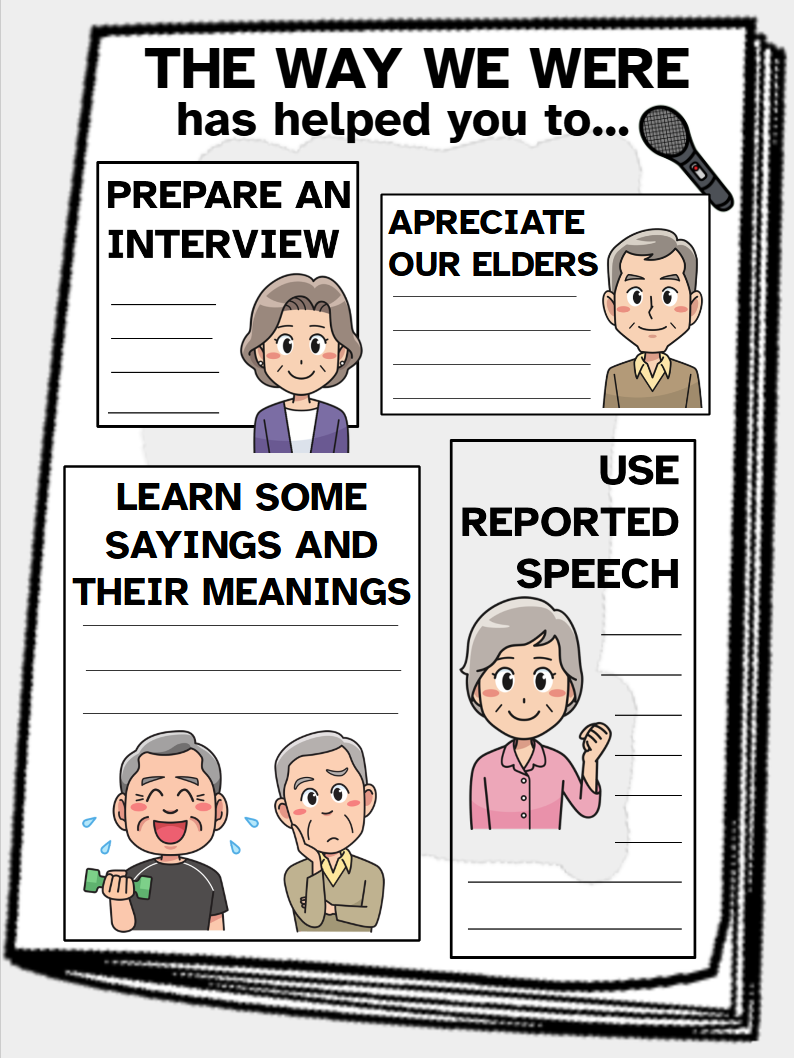| 1. You have worked cooperatively to contact an elder with a fascinating story to tell and to create the questions for your interview. | Your communication and organization with others is excellent. You are perfectly integrated into your team and the final result is unified. (10) | You can work with your group at a good level of performance. You communicate and organize well with the rest of your teammates. (7.5) | At some points you haven’t communicated with your teammates and the result shows that your interview is not organized at some points. (5) | You have worked on your own and haven’t organized properly with your teammates and the final result is not unified. Your team is not integrated. The questions of your interview do not follow a structure or are not related to each other. (2.5) |
|---|
| 2. You have prepared a battery of questions in advance following the pattern for interviews and covering many interesting topics. | You had all your questions prepared in advance. You have touched many topics about life in the past. Nothing was improvised so the result is very professional. (10) | You had to include some more questions in the interview once you began with it. You left some interesting topics out of the interview but at least you got enough information. (7.5) | You realized that you should have worked some more in your questions, and not all interesting topics were included. (5) | Your interview wasn’t well designed, some important questions were missing and you were not able to improvise them. (2.5) |
|---|
| 3. Your questions are relevant. They have obtained interesting information about the life, job, relationships, society, technology, etc of your elders. | You had a very clear idea of what information you wanted to ask and your questions were really focused and went straight to the point. (10) | Your questions were clever enough to get the most important aspects of life, society, jobs, etc of your elders. (7.5) | Although you have asked some interesting questions, you have lost focus at times. (5) | The conversation with your interviewee went without a clear direction. You didn't ask relevant questions and missed some basic information. (2.5) |
|---|
| 4. You have asked your interviewee about old sayings and you have a clear idea of what a saying means. | You have learnt some interesting sayings that your elders used, and you know the correspondence between the English and the Spanish version, now you can use them, too (10) | You have learnt some sayings that your elders used to use, but you don’t know the meaning of all of them or their reference into your own language. (7.5) | You learnt some sayings from your elders, but you don’t know the context and meaning to use them properly or the reference to your language’s saying. (5) | You haven’t learnt any sayings, and you don’t understand how or when to use them properly. (2.5) |
|---|
| 5. Throughout your interview you have realized how society, technology or any other interesting facts have changed. | Your interview has helped you to understand the evolution of society, technology and many other facts you weren’t aware of before the interview. You are definitely able to discuss those changes . (10) | You have become aware of the most important changes that society has gone through by talking to your elders. The interview was effective. (7.5) | Your interview has shown you some aspects of life in the past that were new to you though you could have got to the bottom by improving your interview. (5) | When you were conducting your interview, you didn’t notice any significant changes from the society your elders lived in. Either you have not paid enough attention to the answers of your interviewee or the questions were not the correct ones. (2.5) |
|---|
| 6. You have taken good note of the answers of your interviewee in order to recount the information. | You were able to keep track of all the information collected in the interview by hand or by other means, so that you could work later with that information. (10) | You were able to keep track of most of the information. You had to check some of the information collected afterwards to complete the composition of the interview properly. (7.5) | You missed some of the information that you demanded in your interview because you didn’t record or write it, so you couldn’t check it later to finish your work properly. (5) | You didn’t write or record the interview to check the information afterwards and complete your task, so you could only work with what you remembered. (2.5) |
|---|
| 7. You have reported the information collected in your interview using reported statements. | You’ve used properly reported speech statements, in order to complete your final task writing a composition about the information you found out in your interview. (10) | You’ve used reported speech to write your interview, although you realize there can be some mistakes in statements that you should improve. (7.5) | Some of the statements you’ve used while writing in reported speech were not correct, although you’ve realized what were the mistakes. (5) | You haven’t been able to use reported speech. (2.5) |
|---|
| 8. You have used reported questions when retelling others about the information collected in the interview. | You’ve used properly reported speech questions, in order to complete your final task writing a composition about the information you found out in your interview. (10) | You’ve used reported speech to write your interview, although you realize there can be some mistakes in questions that you should improve. (7.5) | Some of the questions you’ve used while writing in reported speech were not correct, although you’ve realized what were the mistakes. (5) | You haven’t been able to use reported speech. (2.5) |
|---|
| 9. The interview you have conducted has gone well and fluently. | The interview has gone fluent, your interviewee has felt free to answer all the questions and there haven't been any uncomfortable silences. (10) | The interview has gone well and your interviewee has felt comfortable at it. (7.5) | The interview has not been fluent at times, there have been some moments of silence in which you had to repeat the questions. (5) | The interview has not gone well. The interviewee didn't understand some of the questions or you had to clarify most of them in order to continue with the interview. (2.5) |
|---|
| 10. You have appreciated your elders and the knowledge and values they transmit. | You found out interesting information you didn’t know about your elders, and you realize what they have to say is relevant, you feel you could learn much more. (10) | You found out some unknown information about your elders, and you realize you can learn from them by paying attention to their life experiences. (7.5) | You didn’t find out much interesting information from your elders, but you realized you have to learn from their life experiences. (5) | You didn’t really connect with your elder and only completed the questions you had to do to finish your task. You still have much to learn from them. (2.5) |
|---|

